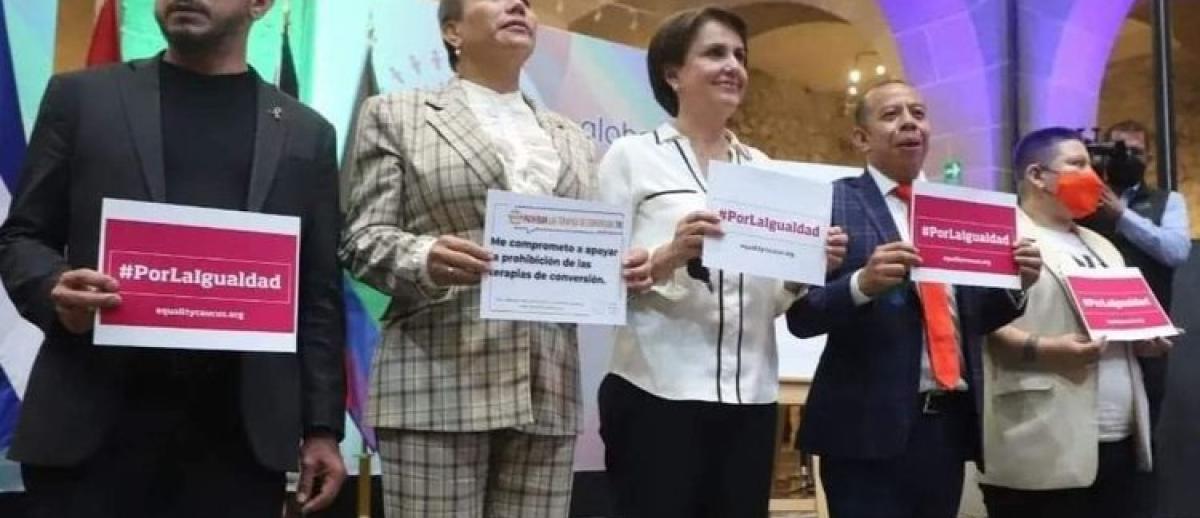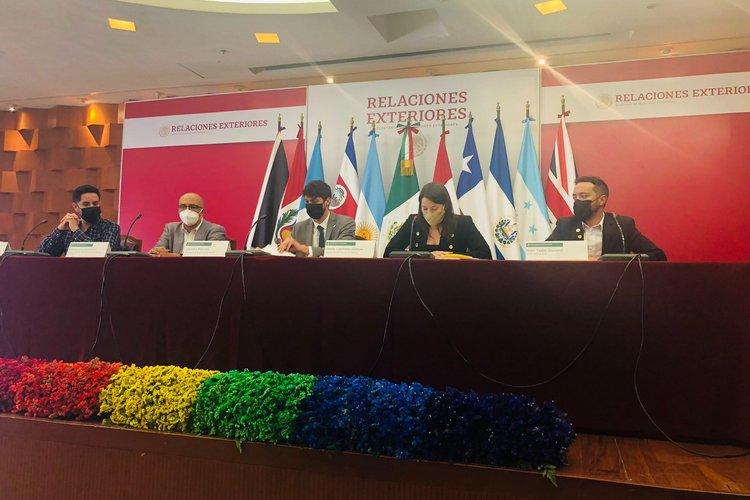Reimagining human rights and the power of LGBT+ mobilization in Latin America: Part 2
archive


Reimagining human rights and the power of LGBT+ mobilization in Latin America: Part 2
This is the second part out of three think pieces that describes what looks like the initial commitment to translate awareness and normative recognition into Mexico’s participation into global action to protect LGBT rights in a country where violence and discrimination continues being a reality. But also, these pieces invite us to imagine new ways to deploy global technologies of subjectification, such as human rights, as a way to claim rights through rebellious politicization. The first part is available here. Alison Brysk lists lobbying, diplomatic intervention, and institutional reform as possible mechanisms showing political will —commitment translated into action (Brysk, 2013: 7). During the conference we saw at least three specific examples of these, out of which I will now focus on the second one: 1) Mexico City’s Congressman Temístocles Villanueva lobbying along with Yaaj Mexico to get other politicians commit to fight against conversion therapies; 2) diplomatic intervention with the participation of foreign embassies in Mexico sharing best practices on legislation and public policies against conversion therapies, and also Mexico becoming the co-chair of the Equal Rights Coalition; and 3) Jalisco’s Director of Sexual Diversity, Andrés Treviño, sharing how they got to reform the Civil Registry offices’ administrative codes to become the first state to guarantee trans youth and adolescents’ right to change their official documentation.
Simultaneously, the conference became a site to rethink rights discourse through reclaiming a broader agenda of social rights that traverse being LGBTI+, or in a Foucauldian framework: a set of counter-conducts —the will not to be governed in a certain way, by a certain group of people, at that price (Foucault 2007: 75). Yaaj’s role in co-organizing the conference allowed to bring forward demands stemming from grassroots movements and the organized civil society. They extended the invitation to activists as panelists and audience members who used those three communication tools, reworked them, and reclaimed their human rights to be governed differently. Through those three processes, activists also voiced at least three needs, out of which I will now focus on the second one: 1) to reverse legislation affecting NGOs; 2) reframing what we understand as conversion therapies to secure broader political action; and 3) participation in government offices and political parties. This event was a different turn where grass-root movements and NGOs were working hand in hand with government officials and international organizations by negotiating and collaborating beyond a human rights campaign against conversion therapy and more towards a comprehensive LGBT+ human rights agenda. Activists were conscious of themselves as right bearers and how they could disrupt subjectivities on what LGBT+ people should reclaim as rights to create a rebellious possibility if being governed differently, and not as a consequence of a legal provision.
The three tools of political will that I include showing political will (lobbying, diplomatic intervention and reform) will appear twofold in this text. First I will describe the ways the human rights campaign of the Global Equality Caucus —the “Regional Pact against Conversion Therapies”— was successful in securing a commitment towards LGBT human rights through a “glocal” political communication campaign. Then, I will show how civil society contested the limits of each of those tools to think about human rights not only as a campaign, but to debate socioeconomic disposability of queer subjectification. It is not enough to have “rainbow quotas”, because people demanded action towards a dignified life. Thinking through Fierro’s research with the workers’ movement in Brazil, people in the Global Equality Caucus conference knew the commitments needed to conduct the tiring fight for LGBT rights (like economic stability, banning conversion therapies and an active voice in political institutions) comes from the consciousness of being right-worthy (Fierro 2019: 402). I do want to clarify that, as Odysseos recognized, we cannot reduce resistance to discernible actions that resist oppression in expressly political registers and in visible and organized forms (Odysseos, 2016: 15). Thus some of the examples I point to will not seem as “energetic” or “revolutionary” as one would imagine, yet they show counter-conducts to debates that were narrowed down or had silenced queer voices for a long time.
Diplomatic intervention and a queer Mexican foreign policy
For a long time the Mexican government didn’t mobilize resources to enhance it’s participation in the regional or global fora around LGBT+ rights. Despite Mexico becoming a member of the UN Core Group on LGBT Rights since 2016 (SRE, 2016), government officials and activists have been vocal on the little political will since then to transform that membership into multilateral action by Mexican diplomats. The GEC launching of the Latin American chapter took place in the Ministry of Foreign Affairs during the second day, signaling an initial commitment by the Subsecretary of Multilateral Affairs and Human Rights to be more openly involved into Mexico’s role as a regional and global leader for LGBT+ rights. Two important moments signaled the role of diplomatic intervention in communicating the message of 1) Mexico’s interest in translating political discourse into political will by sharing best practices across the continent against conversion therapies; 2) Mexico’s renewed role in the global fora for LGBT+ rights.
For the first example, I’m bringing up the participation of the Canadian and the Argentinian embassies in Mexico in a roundtable to share best practices in how they are trying to eradicate conversion therapies through legislative decrees and public policy projects. This panel, compared to others, had a particular aim to share best practices among countries through the continent regarding conversion therapies, but also to position Mexico’s experience that stemmed from civil society’s activism. The Canadian and the Argentinian embassies shared clear evidence as to why the campaign the entire conference circled around was so necessary. They explained different pathways towards legislation and administrative changes as a combined strategy to translate a mere political discourse into policy instruments and bills.

(Roundtable ”Best practices to implement public policies against conversion therapy”. From left to right: Edmundo Montes de Oca, representative from Mexico’s Ministry of Foreign Affairs; Alfonso García Castillo, representative of Mexico City’s Council to Prevent and Eradicate Discrimination (COPRED); Leandro Repetto, representative of the Argentinian embassy; Marie-Carmelle Gélinas, representative of the Canadian embassy; and Iván Tagle, General Director of Yaaj Mexico. Photo by: Global Equality Caucus)
Information politics were also used in a more profound way through the diplomatic intervention of both embassies. The Canadian representative explained the University of Quebec’s research group on sexual and gender diversity are already working to develop public policies around the conversion therapy ban in Canada. During her speech, Marie-Carmelle Gélinas stated Canada is willing to collaborate with any country of the continent to continue sharing best practices and develop public policies tailored to their local, national and/or regional context. As Brysk argues, public intellectuals (in this case those in Quebec’s University) are a critical source of voice for human rights appeals (Brysk, 2013: 65). In this case, the epistemic community in Quebec aims to connect with the rest of the region to develop comprehensive public policies against conversion therapies, thus reaffirming the success of the campaign the GEC led in Mexico City.
Similarly, Alfonso García, from Mexico City’s Council to Prevent and Eradicate Discrimination, explained the process of doing the first written resolution by a government office against conversion therapies. Another form of information politics not stemming from academia, but by a specialized and autonomous institutions like COPRED also served as a critical voice for human rights, and as an example both nationally and globally of experts being pioneers to mobilize solidarity and shift the LGBT+ agenda at that moment towards banning conversion therapies. COPRED recognized that other government institutions had made verbal declarations against these practices, but they realized they needed something written to signal clear support and that could be used as a legal precedent in further legislative processes.
As they envisioned, the COPRED then became the advising institution that worked hand in hand with Congressman Temístocles Villanueva and Yaaj Mexico to draft the bill that was later on passed in Mexico City. The same way Brysk talks about Amartya Sen’s role as a pioneer in development studies, former president of the COPRED Jacqueline L’Hoist pioneered the human rights campaign against conversion therapies using the institutions status, credibility and legitimacy. Thus, in this panel, Mexico positioned itself not only as the host for the continental dialogue, but also as a precursor for a campaign that gives the Americas a very different tool. Mexico used independent human rights institutions stemming from the government itself to push for an agenda that otherwise could have stayed trapped in legislative and executive orderings. Instead, they provided a third-party formal resolution that could be easily taken by any judicial, executive or legislative office trying to show political will and translate discursive support into tangible commitment towards action.
The second moment that turned the campaign successful falls into what Brysk would call a display of the power of performance (Brysk, 2013: 107). Representatives of the Ministry of Foreign Affairs seemed to have attempted in building an allegory when presenting Mexico as the new co-chair for the Equal Rights Coalition. As Brysk describes, moralized narrative appeals have a special mobilizing power to contest injustice (Brysk, 2013: 114). Mexico’s co-chairmanship was endowed with significance (real or imaginary) that it didn’t possess as a mere fact of being named co-chair. The representative of the General Directorate for Liaison with Civil Society explained how there is little participation and representation of Latin America in the ERC. Thus, he openly invited us to participate in building Mexico’s name hand in hand with the Ministry of Foreign Affairs. It was sold almost as a moral duty to both represent Latin America in spaces where we are not given space, and to champion LGBT+ rights in a horizontal coalition that looks at a foreign policy from bottom-up.
Even if the original success of the GEC campaign against conversion therapy was making Mexico a central player for the region in that particular matter, it allowed for the Ministry of Foreign Affairs to extend it’s political commitment into more fora where it can advocate for LGBT+ human rights globally. A larger message that came out of it was a robust foreign policy in favor of LGBT+ rights. An actual foreign policy in favor of human rights in a broader sense is something we could discuss at another moment, considering Mexico’s mounting cases of gender-based violence, the rise in murders against journalist, and the alarming violations of migrants’ human rights. Be that as it may, the broader sense of Mexico continuing its support towards LGBT+ agendas through this enhanced performativity seems to be working.
Challenging dominant forms of global governance
Yaaj Mexico offered a different road to the diplomatic performances taking place in the same panel its General Director, Iván Tagle, participated in. Yaaj pushed for a discursive change they are betting to gain global traction, even more with representatives of Canada and Argentina backing their proposal. For the organization, the GEC human rights campaign shouldn’t center on the term “conversion therapies”, despite it being catchy and easy to understand. Sexual Orientation and Gender Identity Change Efforts (SOGICE) would be a more comprehensive term. It has allowed Yaaj, as it has allowed Argentina and Canada, to expand the scope of action and attention to victims beyond healthcare providers practicing “therapy”. The idea of any effort to change sexual orientation and/or gender identity allows to connect so-called conversion therapies to other stakeholders like religious leaders performing exorcisms, wellness coaches outside the medical sphere carrying on shock therapies, and other non-state actors perpetrating “corrective” rape.
As I stated before, the presence of the International Rehabilitation Council for Torture Victims (invited by Yaaj) also signaled the NGO’s capacity for a new communication strategy that transforms the global campaigns around conversion therapies. It showed a tension between reproducing the message stemming from the Global North, under the UK’s initiative, and forcing to change the narrative within the Caucus’s own event. It may not seem as radical, but Yaaj was truly speaking rights to power, using a different narrative (cruel practices and torture) as a more compelling message that can represent a broader range of action within the local and global fight against these efforts to change someone’s SOGI. Yaaj’s General Director himself embodies this message as by openly speaking how he is a survivor of conversion therapies, including electroshock, deprivation of liberty, and forced starvation. In Fierro’s line of thought, Yaaj is developing resisting subjectivities which seek to overcome narrowing and pathologizing discourses of banning conversion therapies as a right to health, and rather politicize the term to recognize themselves as citizens who deserve a different form of being governed: one that truly sees the extent of damage and trauma these practices can bring upon LGBT+ people.
During the panel, Yaaj’s reaffirmation to consider SOGICE as the term to use is also a radical shift away from Global North epistemologies or political compromises that made them restrict the term to “conversion therapies”. This counter-conduct may not seem revolutionary in its practice but is in its foundation. It constitutes a continual criticism and politicization of the topic (Foucault, 2000: 457; Death, 2010: 248). It was a political act born within resistance to a form of global governmentality with a very restricted sense either of imagination or of political will. C. Death believes an ethic of permanent resistance and continual criticism as counter-conducts are a necessary dimension of social movements and radical democratic politics (Death, 2010: 248). However, Yaaj’s approach is one of defiance that is exercised simultaneously with strategies of governmentality that have them seated in the same panel than diplomatic representatives, but also, as Asl proposes, they are destabilizing a narrative through a counter-history. They invoked specific forms of knowledge (that of the right to not be subject to torture), and reconstituted subjectivities (survivors of a broader array of SOGICE and not only “therapies”) (Asl, 2018: 199).
Note: This is the second out of three parts on a think piece on how to imagine new ways to deploy human rights as forms of rebellious politicization. The first part is available here. The three parts of this project refer to Latin American LGBT+ as a case study, and particularly to the results of the launching of the Latin American chapter of the Global Equality Caucus.
This bibliography includes the cited works from the three parts of this think piece:
Asl, Moussa Pourya. 2018. “Practices of Counter-Conduct as a Mode of Resistance in Middle East Women’s Life Writings” 24 (2): 194–205.
Brysk, Alison. 2013. Speaking Rights to Power: Constructing Political Will. Oxford University Press.
Death, Carl. 2010. “Counter-conducts: A Foucauldian Analytics of Protest”. Social Movement Studies 9 (3): 235–51.
Etcétera. 2022. “Diputada de Morena busca prohibir fondos extranjeros para asociaciones que litigue y cabildeen”. Etcétera. https://www.etcetera.com.mx/nacional/diputada-morena-fondo-extranjeros-asociaciones-litiguen/
Fierro, Alberto. 2019. “Revolutionary Politics of Social Rights? An Ethnographic Account of the Homeless Workers’ Movement in São Paulo”. Millennium: Journal of International Studies 47 (3): 398–416.
Foucault, Michel. 2000. Power. Essential Works of Foucault, 1954-1984 ; v. 3. New York: New Press.
Foucault, Michel, Sylvère Lotringer, y Lysa Hochroth. 2007. The politics of truth. Semiotext(e) foreign agents series. Los Angeles, CA: Semiotext(e).
Kapur, Ratna. 2018. Gender, alterity and human rights: freedom in a fishbowl. Elgar studies in legal theory. Northampton, MA: Edward Elgar Pub., Inc.
McNeilly, Kathryn. 2019. “Are Rights Out of Time? International Human Rights Law, Temporality, and Radical Social Change”: Social & Legal Studies 28 (6): 817–38.
Odysseos, Louiza. 2016. “Human Rights, Self-Formation and Resistance in Struggles against Disposability: Grounding Foucault’s ‘Theorizing Practice’ of Counter-Conduct in Bhopal”. Global Society 30 (2): 179–200.
Secretaría de Relaciones Exteriores. 2016. “México presenta su solicitud para ingresar al Grupo Núcleo de Naciones Unidas sobre derechos de la Comunidad LGBT”. Gobierno de México. May 31, 2016. http://www.gob.mx/sre/prensa/mexico-presenta-su-solicitud-para-ingresar-al-grupo-nucleo-de-naciones-unidas-sobre-derechos-de-la-comunidad-lgbt.



